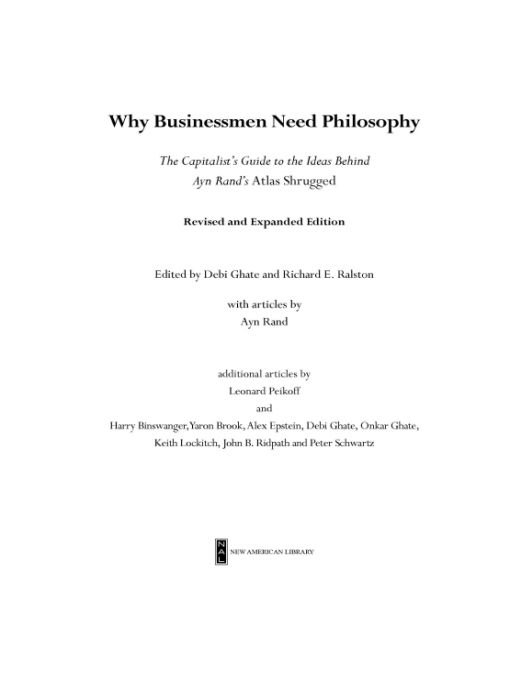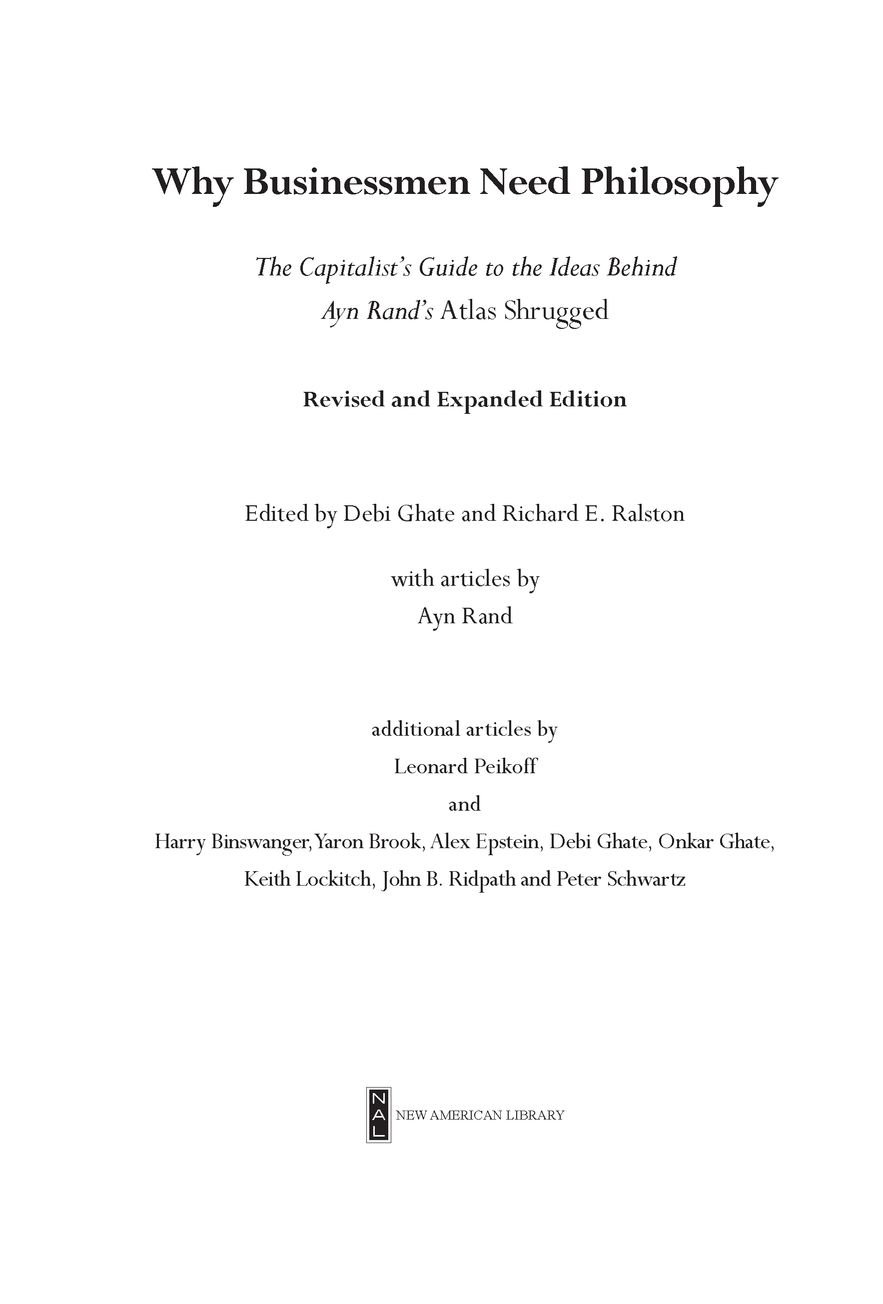Table of Contents
Preface
Ideas are the greatest and most crucially practical power on earth.
Ayn Rand
The publication of the second edition of Why Businessmen Need Philosophy comes at a time when the world faces a serious economic crisis. Under the guise of protecting the public, the government evades its fundamental role in the crisis (e.g., the interest rate manipulations of the Federal Reserve), scapegoats Wall Street, and rapidly expands its already sizeable control over American businesses and the economy. The justification for these attacks usually goes something like this: We let big businesses get away with too much and look at the mess were in. But, we cant live without their production. Therefore, we need to force them to stay afloat and maintain output, but under stricter terms, for the sake of the public. Should businessmen surrender in response to these attacks, or should they fight?
The viewpoint of the essays in this collection is that businessmen can and should respond to the ideological attacks against them. To do so, they need to be armed with the right philosophy. In Part One, several essays examine why philosophy is not an ivory tower escape but a practical necessity at all levels of business, influencing everything from day-to-day decisions to the broadest issues of politics and economics. In Part Two, the philosophical ideas underlying the attacks against businessmen are discussed: to effectively oppose these ideas, one has to understand them. In Part Three, two essays counter the common notion that success in life and in business requires the art of compromise rather than standing on principle. Finally, Part Four offers intellectual ammunition to those businessmen ready to defend themselves against the injustices hurled at them.
The editors wish to thank Ayn Rands heir, Dr. Leonard Peikoff, with whom the idea for this project originated and who prepared the title essay as a talk to the New York chapter of the Young Presidents Organization in 1995.
The second edition of Why Businessmen Need Philosophy is published in tribute to those businessmen who understand the need to proudly defend the moral stature of their professionand to the future businessmen who will carry on in their tradition.
Debi Ghate and Richard E. Ralston
Editors
Acknowledgments
We wish to acknowledge and thank the Ayn Rand Institutes staff (in particular, Simon Federman, Donna Montrezza and Jeff Scialabba) for their research and production support for this project. We also wish to thank Dr. Onkar Ghate for his expert guidance for all of ARIs intellectual projects and Dr. Yaron Brook for his tireless efforts in advancing Ayn Rands ideas in the culture. A special thank-you is owed to ARIs donors whose support over the years has made projects such as this book possible. Finally, we thank Mr. John Allison for providing us with great inspiration as a man who has lived, taught and advocated for what he believes in, and who has shown us that the pursuit of business is both moral and practical.
Introduction
As a long-time CEO, I have had the opportunity to observe many business successes and failures. Sometimes organizations are successful because of fortunate timing. Sometimes organizations fail due to economic factors beyond their control. However, the most common cause of organizational success or failure is the fundamental principles on which the leader of the business acts. Businesses largely succeed or fail based on basic ideasi.e., their philosophynot complex strategies or esoteric activities. Sometimes these concepts are held implicitly rather than explicitly, but the leaders actions are driven by his beliefs.
During my almost twenty-year tenure as chairman and CEO of BB&T, the organization grew from $4.5 billion to $152 billion in assets, becoming the tenth largest financial institution headquartered in the United States. BB&T weathered the recent financial storm better than almost any other large financial institution. Why was BB&T able to grow both rapidly and soundly in a very challenging environment?
In one context, the answer is that we had outstanding people who developed successful strategies. At a deeper level, BB&T has been able to attract and retain these outstanding people due to our core beliefs: BB&T is a principle-driven organization and our values are non-negotiable. This commitment to the philosophy weve adopted has been the crucial foundation of BB&Ts success.
What are the essential philosophical components that a successful business leader needs?
The most important characteristic of successful leaders is their fundamental commitment to making logical decisions based on the facts, and that what is, is. In other words, these leaders are committed to reality. A commitment to rational thinking as a conscious value is a significant competitive advantage. Conversely, one of the most common causes of business failure is evasion by the leader. When faced with information he does not want to hear, he closes off his thinking process and refuses to hear the facts. Being detached from reality ultimately results in disaster. Most truly destructive business decisions are irrational at the time they are made.
It is true that successful business leaders can sometimes make gut-level decisions. However, to be consistently effective these gut-level decisions are based on rigorous thinking through disciplined mental focus over a period of time. The leader has been able to subconsciously integrate facts and concepts through his past thinking. Every once in a while, a business leader makes gut-level decisions without past thinking and gets lucky. However, if he continues this pattern, he will surely make a killer mistake. This is why the most important value a business leader can hold is an uncompromising commitment to rationality. (By the way, the clich that you cannot be both rational and passionate is absurd. The best business leaders are both rational and passionate about their work. In addition, rationality demands honesty, integrity, independent thinking, productivity, and justice. It further demands a long-term perspective. You cannot be rational without all of these virtues.)
Why is it difficult for business leaders to be consistently rational in their decision-making? There is a major philosophical trap based on the most common cultural beliefs in our society that undermines many business leaders. This trap is the combination of altruism and pragmatism. Lets look at each of these sets of ideas.
Altruism demands that our primary goal in life is to serve others. You cannot seriously be an altruist and run a successful business in a competitive market. Altruism demands that any time you develop a market advantage, you have to turn over the advantage to your competitors. One would soon be out of business if one were to take this approach seriously. Business leaders often pay lip service to altruism, but they know they cannot be an altruist in practice and still stay in business. However, because they believe they should be altruistic, business leaders experience guilt and conflict, sometimes leading them to make poor decisions and often depriving them of much earned happiness.
This contradiction that businessmen find themselves trying to uphold is an illusion. Business is noble work. The noblest act of a businessman is creating better products and services and earning the wealth which comes from this process. It is very easy to give money away (especially if it isnt yours), but earning it is hard. Think of the irony and injustice that occurs whenever a business leader is told to give back to the community or face moral scornthat business leader has already created a better standard of living for his customers and provided jobs for employees.










